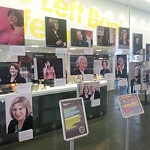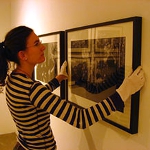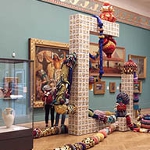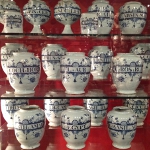Work placements
Getting involved with work placements and residencies is a great way to learn and make useful contacts.
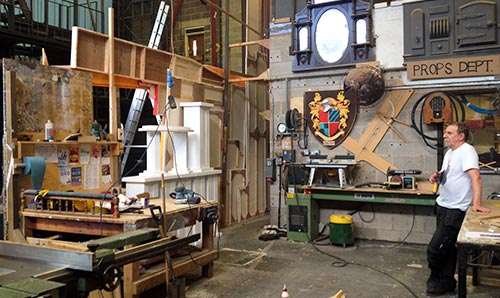
Placement projects are based in arts and cultural organisations. They are arranged by the Institute for Cultural Practices.
Each placement involves a minimum of twenty days work on a specific project, such as:
- collections management
- event development and evaluation
- audience engagement
- exhibition development
- marketing and fundraising
- digital and online media
- educational programmes.
How long is a placement?
Placements are twenty days. You start your placement in November/December and finish in May. This means that you get to see and be involved in various stages of the project that you would be working on, e.g., a festival programme or exhibition project that spans several months.
Spreading out the placement over several months also allows you to be part of the organisation’s team over a more extended period and better understand the institutional time, processes and practices.
Many students find this such a positive experience that they carry on working in their placement organisation when the work placement has finished, and each year, a few students are offered jobs by their placement hosts.
Is the placement credited?
Students write a work placement report that reflects on the undertaken project. You take the work placement as a 30-credit course.
Can part-time students take part?
Part-time students who work already in an arts or cultural institution have the option to either take one of the placements we offer, or create a placement project within their organisation in collaboration with their line manager. These students can do their placement either in Year 1 or Year 2.
Examples of placements offered in 2023-24
Cartwheel Arts Ltd
Crafting Heritage Volunteer
Crafting Heritage is a new National Lottery Heritage Funded project that will explore and celebrate the heritage crafts of refugee and asylum seeker communities within Rochdale. This 2-year project will capture diverse heritage crafts, which will be documented and archived at Touchstones Gallery and shared with Heritage Crafts UK, who will add any engaged crafts to their 'red-list'.
As part of the project, Cartwheel will offer a fully paid eight-week training placement for four emerging craftspeople with experience in forced migration. This placement role will support the Coordinator in setting up and delivering the first phase of this project, including the community co-production sessions and sharing the paid training opportunity widely with local partners and networks.
As part of the placement, students can expect to attend and support the community outreach sessions and take on administrative tasks, including capturing monitoring information and connecting with local partners and communities. They will also have the opportunity to see what managing a participatory arts/heritage project is like, as well as learn more about the broader work of Cartwheel Arts.
Manchester Museum
Digitisation of Cultural Entomology Related Artefacts
The role is digitising a contemporary collection of cultural related artefacts stored in a temporary cabinet. At the Entomology collection we have acquired many different objects inspired by insects and other invertebrates from around the world, which need documenting and proper storage.
The placement will involve the documentation of every object using Excel to record place of origin, material, type (toy, decorative, game, etc) and a brief description. It will also include accessioning the objects, marking and labelling, image records and packing and storing them. This will contribute to an easier access and availability for future use, such as future exhibitions, displays, engagement and outreach activities. If time allows, a small analysis of the objects could be carried out, perhaps looking at insect inspiration, place of origin, symbolism, type, etc.
Chorlton Voice - Chorlton Arts Festival
We are a friendly local community arts festival run entirely by volunteers (2023 was a 10-day festival with 145 events across 44 local venues). The Festival will be on 17th-26th May, 2024. The Festival is a celebration of local artists and local venues (both commercial, such as pubs, cafés; and non-commercial, such as churches).
We are offering the opportunity for a student to strengthen the festival's links with local venues and develop a programme of pre-Festival events. This will include building on and developing relationships with venue hosts to better understand and meet their needs by the Festival.
Deliverables might include, for example, an action plan for building and strengthening relationships with venue hosts; a step by step guide for implementing the action plan along with other volunteers; creating a pre-festival programme, and outlining a venue-impact monitoring framework.
If feasible, there will be opportunities to train other volunteers in best practice for strengthening venue relationships. Within this there will be opportunities to use and develop on-line and face to face communication skills, as well opportunities to participate in festival planning and event scheduling.
Manchester jazz festival
mjf New Commissions Assistant
Manchester Jazz Festival is the city’s longest-running music festival and an established part of Manchester’s cultural heritage, staged over ten days in May. We connect various venues and landmark environments, champion northern artists performing new and original music, run year-round artist development programmes, commission groundbreaking new works, and pioneer collaborations. Through all of our work, we celebrate diversity, creativity and boundary-pushing innovation.
The placement will work during the planning period for the 2024 festival to assist commissioned artists and mjf’s Artistic Director, Producer, General Manager, Festival Assistant and Audience Development team with the production and delivery of two groundbreaking pieces of newly commissioned music as part of our mjf originals programme. These will be dynamic music creations that engage communities as part of their creative process.
Student experiences
-
Amy Barson: Elizabeth Gaskell's House
For my placement I worked with those who are currently in the process of renovating and re-opening what was once the house of Elizabeth Gaskell (1810–1865) and her family.
I chose this placement because I have always been interested in historic house museums. This placement option not only offered me the opportunity to become involved with such a museum, but also to explore my love of Victorian literature within a museum context.
Read more about Amy's experience on the ICP blog
-
Zofia Kufeldt: People's History Museum
My placement was located at the People’s History Museum (PHM) working on the Arts Council funded project Play Your Part (PYP).
The project aim was to make the museum more relevant to today’s audiences by responding to current events, linking them to campaigns of the past, with the hope of inspiring activists for the future.
Read more about Zofia's experience on the ICP blog
-
Dominique Myrand: Open Eye Gallery
As part of my MA in Art Gallery and Museum studies, I had the opportunity to do my work placement at the Open Eye Gallery in Liverpool, the only gallery dedicated to photography and related media in the North West of England.
I was involved with the Open Eye team as Exhibition and Research Assistant, therefore mainly working with the Exhibition Coordinator on the development of the current exhibition, from the conceptual phase to the installation.
Read more about Dominique's experience on the ICP blog
-
Lori Symcox: Manchester Art Gallery
For my placement I was worked as a collections access assistant at Manchester Art Gallery within the Victorian Art and Pre-Raphaelite gallery, under the supervision of Rebecca Milner, one of the curators there.
One of the main reasons that I chose to pick this particular placement was due to experience that I have regarding Victorian Art; this placement therefore gave me a great opportunity to further my knowledge on that particular topic.
Read more about Lori's experience on the ICP blog
-
Madeline Witek: Thackray Medical Museum
The Thackray Medical Museum in Leeds is truly a diamond in the rough: housed in an old nineteenth-century workhouse and attached to St. James’s Hospital, it is a short bus ride out of the city centre.
In my placement at the museum, I was designated the role of ‘Wilkinson Redevelopment Officer’ and it was my job to identify key issues with the gallery and find ways to make it accessible and visible to the Thackray’s visitors.
Read more about Madeline's experience on the ICP blog


